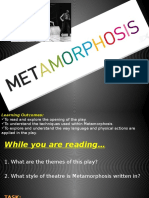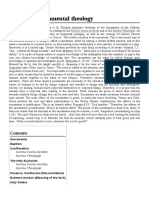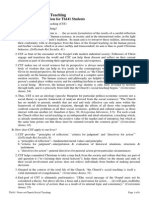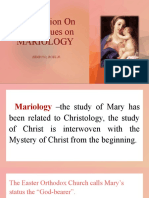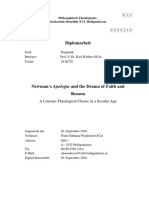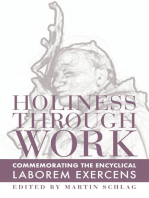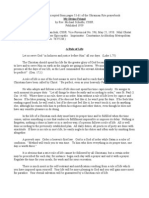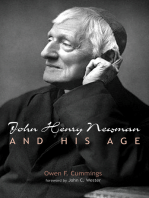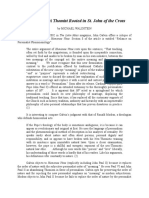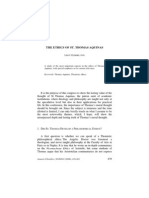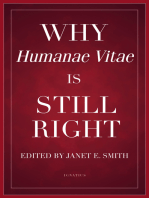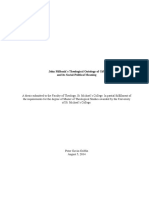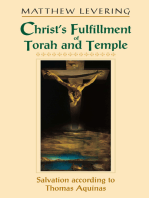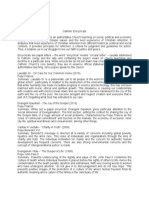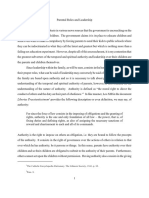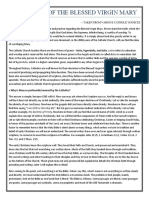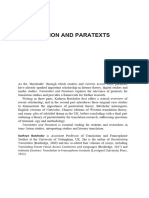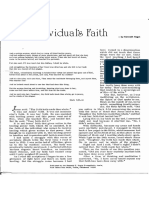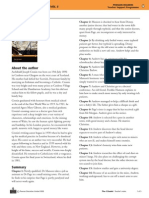Augustin and Aquinas On Marriage
Augustin and Aquinas On Marriage
Uploaded by
Thomas Aquinas 33Copyright:
Available Formats
Augustin and Aquinas On Marriage
Augustin and Aquinas On Marriage
Uploaded by
Thomas Aquinas 33Original Title
Copyright
Available Formats
Share this document
Did you find this document useful?
Is this content inappropriate?
Copyright:
Available Formats
Augustin and Aquinas On Marriage
Augustin and Aquinas On Marriage
Uploaded by
Thomas Aquinas 33Copyright:
Available Formats
Theological Studies 73(2012)
TOWARD A VIRTUE ETHICS OF MARRIAGE: AUGUSTINE AND AQUINAS O N FRIENDSHIP IN MARRIAGE
LISA FULLAM
Pius XI called the mutual perfection of spouses "the chief reason and purpose" of marriage, thereby opening the door for a consideration of the virtues spouses may seek in marriage. The article shows that for Augustine marriage is an instrumental good, serving the larger end of friendship, and that for Aquinas the bond of spousespotentially a friendship of virtueis the form, or defining quality, of marriage. The article concludes with a methodological coda on how and why a turn to virtue might be brought to the fore in a Catholic ethics of marriage.
OPE PIUS XI, IN HIS 1930 ENCYCLICAL Casti connubii, upended the
traditional teaching that procreation is the primary end of marriage. He reiterated the three goods of marriage specified by Augusfine: oftspring, fidelity, and the sacrament. Then he wrote: while "amongst the blessings [goods] of marriage, the child holds the first place";^ he then elaborated:
This mutual molding of [spouses], this determined effort to perfect each other, can in a very real sense, as the Roman Catechism teaches, be said to be the chief reason and purpose of matrimony, provided matrimony be looked at not in the restricted sense as instituted for the proper conception and education of the child, but more widely as the blending of hfe as a whole and the mutual interchange and sharing thereof."^
LISA FULLAM received her ThD from Harvard Divinity School and her DVM from New York State College of Veterinary Medicine (Cornell University). Now associate professor of moral theology at the Jestiit School of Theology of Santa Clara Utiiversity, she specializes in virtue ethics, sexual ethics, bioethics, and Ignatian ethics and spirituality. She has most recently published: Virtue, Readings in Moral Theology 16 (2011), coedited with Charles E. Curran; The Virtue of Humility: A Thomistic Apologetic (2010); "Ethics in Spiritual Guidance," Refiective Practice: Formation and Supervision in Ministry 60 (2010); and with William R. O'Neill, S.J., "Bioethics and Public Policy," Theological Studies 71 (2010). In progress is a monograph entitled "Virtue in Action: A Virtue Ethics Approach to Contemporary Issues," and a collection entitled Ethics and Spirituality, in Paulist Press's Readings in Moral Theology series, coedited with Charles E. Curran.
^ Pius XI, Casti connubii no. 11, http://www.vatican.va/holy_father/pitis_xi/encyclicals/ documents/hf_p-xi_enc_31121930_casti-connubii_en.html. This and all other URLs cited herein were accessed on June 12, 2012. ^ Ibid. no. 24. In 1944 John C. Ford and Gerald Kelly puzzled over this curious statement. They cite contradictory messages from Arthur Vermeersch, S.J., one of 663
664
THEOLOGICAL STUDIES
To the ears of a virtue ethicist, the language of mutual perfection begs the question of virtuesafter all, according to Aquinas, "virtue denotes a certain perfection of a power. "^ Virtues are excellences of natural capacities; so to be virtuous is simply to live in accord with one's nature. Also according to Aristotle, our closest friends are those who form us in virtue. So when Pius speaks of mutual perfection of spouses, he invites an exploration of marriage in its broad sense as a friendship of mutual formation in virtue. This vision of marriage as a friendship for formation in virtue has not been absent from earlier sources in Christian tradition, but it has been underdeveloped. This view had been obscured in favor of defining marriage principally in terms of the ends or purposes of the institution of marriage itself, or in terms of the ends of sex, not marriage. But marriages consist of relationships between human beings, each of whom is invited to pursue growth in virtue toward an ideal of flourishing, and who are engaged in this project offlourishingtogether. Insofar as marriage is a state of life that is consonant with humanflourishing,it must serve not merely its own ends but also those of the people in it. This article traces the interrelated concepts of friendship, marriage, and virtue in two primary sources for Christian doctrine on marriage: Augustine and Aquinas. In both authors, the concept of friendship is the context within which marriage is described. That larger context, relativizing the specific goods (or ends) of marriage itself, has been missed, ignored, or undervalued in much subsequent writing on marriage. To frame this investigation, I begin with a summary of Aristotle's work on friendship and its connection to virtue. I start with Aristotle because, in addition to being a principal source for Aquinas's consideration of marriage, Aristotle parses friendship in terms that will help elucidate what went missing in Christian doctrine on marriage.
the drafters of the encyclical. They write: "In 1931 Vermeersch said that the broader sense here means a more 'comprehensive,' or extended concept of marriage, which does not exclude marriage in the strict sense, but presupposes it. (He wanted to forestall any attempt to conceive as possible a marriage without its primary end.) But in 1932, he also asserted that the total community of life mentioned here is not something over and above the mutual gift of themselves which the spouses have made to one another with a view to the procreation and rearing of children, 'since it began and sprang from the mutual giving of self, and at the same time is its crown and glory.' Then in 1933, to add to the confusion, Vermeersch says, in a puzzling phrase, that this total community of life is 'another natural, not secondary end' of contracting" (John C. Ford and Gerald Kelly, "The Essential Subordination of the Secondary Ends of Marriage," in Marriage, Readings in Moral Theology 15, ed. Charles E. Curran and Julie Hanlon Rubio [New York: Paulist, 2009] 22-35, at 30). ^ Thomas Aquinas, Summa theologiae (hereafter ST) 1-2, q. 55, a. 1 c, http:// www.ccel.org/ccel/aquinas/summa.FS_O55_Al.html.
A VIRTUE ETHICS OF MARRIAGE
665
I then turn to Augustine, perhaps the most influential figure in Christian theology, and rivaled only by Aquinas as a shaper of Catholic moral teaching. Augustine specified three goods of marriage: proles, fides, and sacramentum. However, his major work on marriage begins by framing marriage itself as a kind of friendship. He goes on to describe marriage itself as an instrumental good, serving the broader end of friendship of spouses. Where the three goods of marriage conflict with the broader good of friendship of spouses, Augustine prioritizes friendship over the goods. Next, I look to Aquinas, the great creative synthesizer of Aristotelian methodology with Christian (specifically Augustinian) tradition. His early writing on marriage echoes Augustine's three goods of marriage, which he translates into ends. However, Aquinas's thought on marriage develops: in his mature work, the friendship between spouses is the form of marriage it makes marriage what it is. Marriage has three ends, but it is defined as a friendship potentially of virtue.'* I then recap the reaction to this passage of Casti Connubii. Personalist theologians following Pius XI were censured by Pius XII, and subsequent tradition seems to muddle marital ethics with sexual ethics, circumscribing questions of the broader notion of marriage with teachings on sexual morality. My intention in this section is not to offer a complete analysis of post-Vatican 11 teaching on marriage, but only to show one important shift: Pius XI's opening to language of virtue is gone. Finally, I conclude with two methodological notes on how we might begin to address the specifics of marital virtues, and some preliminary reflections on why a return to a virtue approach to marriage would be pastorally helpful. So first, Aristotle.^
" Lisa Sowie Cahill observes: "One aspect of Aquinas's view of marriage which * frequently seems to be overlooked is his honest esteem for the intensity of love between husband and wife, which he associates with their union in 'one flesh.' He . . . says that wife and husband enjoy friendship of the greatest sort" (Between the Sexes: Foundations for a Christian Ethics of Sexuality [Philadelphia: Fortress, 1985] 106). Cahill's focus in this section of her work is on Aquinas's natural-law moral anthropology, whereas here I trace the language of friendship and marriage in Aquinas. ^ I do not consider here the sacramental character of Christian marriage in the sense of "one-of-seven" sacraments. Such an endeavor would take me far afield from my concluding question of how we begin to discern which virtues we may acquire in marriage; any infused virtues that come with the sacrament can take care of themselves. Numerous other writers have explored the "one-of-seven" sacramentality of Christian marriagee.g., Karl Rahner, "Marriage as a Sacrament" (351-66); Walter Kasper, "The Sacramental Dignity of Marriage" (340-50); and Francis Schssler Fiorenza, "Marriage" (313-39), all in Sexuality, Marriage, and Family: Readings in the Catholic Tradition, ed. Paulinus Ikechukwu Odozor, C.S.Sp. (Notre Dame, IN: University of Notre Dame, 2001); Todd A. Salzman, "Friendship, Sacrament, and Marriage: The Distinction between Christian Marital Friendship and
666
THEOLOGICAL STUDIES
ARISTOTLE O N FRIENDSHIP AND VIRTUE
Friendship is extraordinarily prominent in Aristotle's Nicomachean Ethics, occupying his attention for nearly two of the ten books in the whole work. For Aristotle, it is in the mutual exhortation and accountability of our closest friendships that we become virtuous. Stanley Hauerwas observes;
For Aristotle friendship is not just a necessity for living well, but necessary if we are to be people of pracfical wisdom. Through character-friendships we actually acquire the wisdom necessary, and particularly the self-knowledge, to be people of virtue. We literally cannot do good without our friends, not simply because we need friends to do good for but because the self-knowledge necessary to be good comes from seeing ourselves through our friendships.^
In the Nicomachean Ethics, Aristotle describes friendship in three species; friendship of pleasure, friendship of utility, and friendship of virtue. The first two forms are transient, but "complete friendship is the friendship of good people similar in virtue."^ Friendships between the virtuous include pleasure and utility but transcend them, looking to the true good of the other; "those who wish goods to their friend for the friend's own sake are friends most of all."^ Because of this dynamic combination, friendship of virtue, while rare, is enduring, "since it embraces in itself all the features that friends must have."' For Aristotle a friend is another self, a partner in life's work of becoming virtuous. Friendship is a necessary component of happiness; "Anyone who is to be happy, then, must have excellent friends."* Between men and women, Aristotle opines that friendship is aristocratic (because of men's natural superiority to women),** but still it is natural, and that natural friendship can be the locus of the couple's moral perfection; "For the other animals, the community goes only as far as childbearing. Human beings, however, share a household not only for childbearing, but also for the
Non-Christian Marital Friendship" (115-24) and Thomas M. Kelly, "SacramentaUty and Social Mission; A New Way to Imagine Marriage" (144-53), both in Marriage in the Catholic Tradition: Scripture, Tradition, and Experience, ed. Todd A. Salzman, Thomas M. Kelly, and John J. O'Keefe (New York; Crossroad, 2004); and Archbishop Raymond Hunthausen, "The Sacrament of Matrimony," Origins 12 (1982) 229-38. Stanley Hauerwas, "Gay Friendship; A Thought Experiment in Catholic Moral Theology," in Theology and Sexuality: Classic and Contemporary Readings, ed. Eugene F. Rogers Jr. (Maiden, MA; Blackwell, 2002) 289-308, at 298. ' Aristotle, Nicomachean Ethics (hereafter NE) trans. Terence Irwin (Indianapolis: Hackett, 1999) 1156b. * Ibid. ' Ibid. * NE 1170b. ** NE 1160b.
A VIRTUE ETHICS OF MARRIAGE
667
benefits in their life. . . . For this reason, their friendship seems to include both utility and pleasure. And it may also be friendship for virtue, if they are decent."*^ Much of Christian tradition has considered marriage analogously either to friendship of pleasure, in which marriage was seen as a hcit setdng for se^ (regarded often as a dangerous pleasure itself justified principally or in part by the prospect of procreation) or to friendship of utihty, in which partners get from each other children, assistance in raising them, and, in the case of women in Aristotle's (and Aquinas's) understanding, stable caretaking of the weaker and less rational female partner. In Aristotelian terms, what has been missing or underplayed in much Christian thinking about marriage is consideration of the complete level of friendship in which the virtuous pursue the "mutual perfection" of which Pius XI wrote. Further, the specifics of just what such a friendship entails has not been the subject of attention. So Aristotle draws a strong tie between friendship and virtueno good life is possible without intimate friends, the kind of friends who accompany, console, and challenge us to grow with them in virtue. While marriage is not a subject of special attention for Aristotle, he recognizes that marriage may be a friendship of virtue, even though the spouses are unequal from the outset. Due to his faulty moral anthropology of nattiral male superiority,*-' he does not consider whether (opposite-sex) spouses might offset each other's weaknesses mutuallysuch equality is more a matter of male-male (or female-female) relationships only. But virtue is forged in friendship. I now turn to Augustine for an account of marriage cast in terms of friendship.
AUGUSTINE: MARRIAGE AS AN INSTRUMENTAL GOOD OF FRIENDSHIP
Marriage posed a difficult problem for Augustine, and his problem was chiefly with sex.*'* For Augustine, unruly sexual desire and even the
*^ NE, 1162a. The word epieiks translated here as "decent," also implies what is fitting or suitable. " Aristotle regards women as deficient men, less rational, more emotional, and to be educated only toward their proper role as mothers and caretakers of the house. The evidence in Aristotle's writings is copious; the two citations here are representative; "The woman may be said to be an inferior being" {Poetics, Part 15, trans. S. H. Butcher, http;//classics.mit.edu/Aristotle/poetics.2.2.html); "females are weaker and colder in nature, and we must look upon the female character as being a sort of natural deflciency" {On the Generation of Animals, trans. Arthur Platt, http://ebooks.adelaide.edu.aU/a/aristotle/generatiori/book4.html) 4.6. 1" As I show later, regarding recent magisterial teaching, marital ethics largely overlaps sexual ethics throughout Christian tradition. Granted that marriage is a relationship that features (one hopes) sexual intimacy, still the tendency to conflate the two ethical questions is a genre error. Here I focus on marriage, which will
668
THEOLOGICAL STUDIES
unpredictability of the sexual organs are paradigmatic of concupiscence, the disordered desire of all kinds that is the wreckage of the Fall of humanity. In Augustine's mind, sex is sinless only within marriage, and even then only when one intends either procreation or the slaking of one's partner's concupiscence without consenting inordinately to sexual pleasure oneself. Sexand by association, marriagewas not something Augustine felt he had to celebrate, but rather to justify: given the nonrational delight of sex, what would compensate for the danger? As a Christian, Augustine could not object to marriage, seeing it in Adam and Eve's life together in the creation narratives of Genesis. Augustine decided that marriage after the Fall is still a good thing because it is tied to three specific goods: proles (offspring), fides (faithfulness,) and sacramentum (by which he meant persevering commitment). Among these goods, he generally places procreation first, though sometimes fidelity is coequal with procreation. For example, in De coniugiis adulterinis (composed 419 to 420), he writes: "Propagation of children, therefore, is in fact the primary, natural and legitimate purpose of marriage," ^^ although in other places he lists maritalfidelityfirst^^or prioritizes the sacrament over procreation, at least for Christians.^^ The word he uses for "purpose" is causa, not finis (end). "Nevertheless," argues Theodore Mackin, "his goods do imply finality. Since they are the advantages marriage can bring to private persons and to their societies, they are what a person may seek to realize in marriage."^^ In Contra
involve discussing sex, while trying not to stray into territory more properly covered in a consideration of sex itself. Marital ethics can be understood to include, but not be Umited to, tnatters of sexuality. For virtue approaches to sexual ethics, see James F. Keenan, "Virtue Ethics and Sexual Ethics," Louvain Studies 30 (2005) 180-97. Also Lisa Fullam, "Sex in 3-D: A Telos for a Virtue Ethics of Sexuahty," Journal of the Society of Christian Ethics 27 (2007) 151-70; and John S. Grabowski, Sex and Virtue: An Introduction to Sexual Ethics (Washington: Catholic Utiiversity of America, 2003). ^^ "Propagatio itaque filiorum ipsa est prima et naturalis et legitima causa nuptiarum {De adulterinis coniugiis" 2.12, in Marriage and Virginity, Works of Saint Augustine: A Translation for the 21st Century, ed. John E. Rotelle (Hyde Park, NY: New City, 1999) 175. See also: "De nuptiis et concupiscientia" (also composed 419 to 420) 2.42, where he writes: "Marriage was instituted not for the purpose of sinning, but of producing children" (http://www.newadvent.org/fathers/15072.htm). ^* See Augustine, De Genesi ad litteram 9.7.12. " "The good of marriage . . . lies in the purpose of procreation and in the faithful preservation (fides) of chastity. But for the people of God the good of marriage lies also in the hoUness of the sacramental bond {sacramentum). Because of this holiness, it is wrong for a woman to marry another man, even if she leaves with a bill of divorce, as long as her husband is alive" {De bono coniugali 32 [Rogers, Theology and Sexuality 85]). ^^ Theodore Mackin, "Augustine on the Nature of Marriage," in Sexuality, Marriage, and Family 169-82, at 178.
A VIRTUE ETHICS OF MARRIAGE
669
Faustum Manichaeum (composed 397 to 399), Augustine gives a quick etymology of "matrimony": "The word 'matrimony' shows that a man takes a wife in order that she may become a mother."^^ Marriage, then, is first and foremost for procreation. But there is more to be said. Many of Augustine's texts were written in response to particular pastoral or theological challenges. De coniugiis adulterinis principally concerns the question of divorce and remarriage in Scripture and related pastoral problems.^ In his other late work on marriage. De nuptiis et concupiscentia, Augustine arguesagainst "some imprudent persons [who] suppose that this is not an added evil, but something which appertains to the original good"that concupiscence is not essential to marriage.^^ The bulk of the text concerns not marriage itself but original sin and its residuum of concupiscence. Both of these were written late in Augustine's life, the latter when he was responding to accusations by Pelagians that he still had not shaken off the yoke of Manichaeanism. In some Manichean thought, procreation was seen as a moral evil since it amounts to the trapping of (innocent) spirit in (sinful) flesh. These texts have more to say about the particular concerns at handmarriage and divorce and marriage and concupiscencethan about marriage generally. If we want to hear Augustine's fundamental thoughts on marriage, we have to look 18 years earlier to his response to the Jovinian controversy. Jovinian (d. ca. 405), a former monk, insisted that ascetical practices like celibacy and fasting do not merit the Christian any special status with God. Rather, baptism establishes the Chrisfian before God. Jerome responded with Adversus Jovinianum (393), a savage attack on marriage. Though Jovinian's condemnation by the church and his banishment by the emperor was old news by the time he wrote, Augustine waded into the fray to offer a Christian account of marriage.^^ De bono coniugali (401) starts with an
^' "Matrimonium quippe ex hoc appellatum est, quod non ob aliud debeat femina nubere, quam ut mater fiat" (Contra Faustum Manichaeum 19.26, ET at http://www.newadvent.org/fathers/140619.htm); mater (mother) -I- monium (state, action, or condition); nubere (to marry), from which comes "nuptial." ^ And with his admirable humility, he admits in Retractationes {Revisions) that he is not at all confident that he has solved the question at hand. "I wrote two books on adulterous marriages with the desire of solving, according to the scriptures, to the best of my ability, a very difficult question. I do not know whether I have done this very clearly" {Retractationes 2.83, cited in Rotelle, Marriage and Virginity 141; also expressed in De coniugiis adulterinis 1.25.32). Augustine, De nuptiis et concupiscentia 1/8, http://www.newadvent.org/fathers/ 15071.htm. ^^ Jovinian was condemned by synods in Rome under Pope Siricius and in Milan under Ambrose in 393. In 398 he was ordered by Emperors Honororius and Theodosius to befloggedand was exiled to the island of Boa. See Rotelle, Marriage and Virginity 15.
670
THEOLOGICAL STUDIES
assessment of marriage that distinguishes it from sex, and casts it as a form of friendship:
Every human being is part of the human race, and human nature is a social reality and possesses a great and natural good, the power of friendship. For this reason, God wished to create all human beings from one, so that they would be held together in human society, not only by the similarity of race, but also by the bond of blood relationship. Therefore the first natural union of human society is the husband and wife.... The result is the bonding of society in children, who are the one honorable fruit, not of the union of male and female, but of sexual intercourse. For there could have been some kind of real and amiable union between the sexes even without sexual intercourse, a union in which the one rules and the other ^'
Obviously this is not a feminist text (despite the ambiguity here of exactly who rules and who obeys). But what is striking here is the depiction of friendship as characterizing marriage, friendship first of the spouses, then of their offspring. Procreation justifies sex, but even apart from sex, spouses could be natural friends. Friendship for Augustine is a signal grace of human life: "What consoles us in this human society, so full of errors and hardships, except unfeigned faith and the mutual love of good and true friends?"^" In his Confessions he writes movingly of the death of a friend:
My eyes looked for him everywhere, and he was not there. I hated everything because they did not have him, nor could they now tell me "look, he is on the way," as used to be the case when he was alive and absent from me. I had become to myself a vast problem, and I quesdoned my soul "Why are you sad, and why are you very distressed?" But my soul did not know what reply to ^^
Friendship can lead us astray, as it did for Augustine in his youthful theft of pears, and as Adam found in joining Eve in her fruit-related sin in the earlier garden, yet still friendship remains an important good. Further, sex "is good in itself and does not necessarily constitute an obstacle to the 'friendship' that is the foundation of the family. Indeed, it can contribute warmth and energy to the oneness of heart that friendship demands."^^ But while sexual desire is natural and good, it is easily corrupted by concupiscence and can warp marital friendship.
^^ Augustine, De bono coniugali 1.1 (Rogers, Theology and Sexuality 71). ^'* Augustine, City of God 19.8, quoted in Augustine through the Ages: An Encyclopedia, ed. Alan D. Fitzgerald, O.S.A. (Grand Rapids, MI: Eerdmans, 1999) 373. ^' Augustine, Confessions, trans. Henry Chadwick (New York: Oxford University, 1992) 57-58. ^* Donald X. Burt, O.S.A., Friendship and Society: An Introduction to Augustine's Practical Philosophy (Grand Rapids, MI: Eerdmans, 1999) 117.
A VIRTUE ETHICS OF MARRIAGE
671
Later in De bono coniugali, Augustine describes marriage as an instrumental good;
Surely it must be acknowledged that God gave us some goods to be sought for their own sake, such as wisdom, good health, and friendship, and others that are necessary for the sake of something else, such as learning, food, drink, sleep, marriage and sexual intercourse. Some of these goods are necessary for wisdom, such as learning; some are necessary for good health, such as food and drink and sleep; and some are necessary for friendship, such as marriage and sexual intercourse, for these lead to the propagation of the human race, in which a friendly association is a great d^'
Here, a word about goods and ends. Ends of human acts are hned up from the most proximate to the most remote. I intend to extend my elbow in a certain way, in certain circumstances, and a basketball is launched toward a hoop. Why? I intend to shoot a ball and score a basket. Why? I intend to help my team win the NCAA championship. Why? I intend to be the greatest player on my team, so that I will be famous. Why? Being famous is a part of "happiness" as I understand it. Generally, the goods of the particular endeavor are coherent with the larger endeavorgenerally, a shot made with good form is more helpful in winning the game, etc., than a sloppy shot. Because of this, seeking the goods of the particular is helpful in achieving the larger good, at least if the particular goods are adequately named. In most situations seeking marriage's own goods serves the larger end, if the goods are adequately named. But if we want to see whether the parficular goods always cohere with the larger good, we need to consider situafions in which goods and ends conflict. For example, if I shoot a ball with perfect form while disregarding the larger end of winning the game, my fulfilling the end of the shot is misplaced, and possibly narcissistic. Perhaps I should pass the ball rather than shoot it, or if the clock is running out, I might sacrifice perfect form and heave the ball to try somehow to get it through the basket. It is similar with marriage as an instrumental good of friendship. Todd Salzman and Michael Lawler note that Augustine "has falsified in advance the claim of those modern commentators who say that only in modern times have sexual intercourse and marriage been seen in the context of the relationship of the spouses."^^ If marriage is instrumental, it must be judged
Augustine, De bono coniugali 9 (Rogers, Theology and Sexuality 78). Two points in this passage are noteworthy; (1) Augustine emphasizes only the friendship of the offspring, not of the spouses. But (2) he does not retract his statement about spousal friendship from earlier in the document. ^* Todd A. Salzman and Michael G. Lawler, The Sexual Person: Toward a Renewed Catholic Anthropology (Washington; Georgetown University, 2008) 31.
672
THEOLOGICAL STUDIES
not only according to its own goods of fides, proles, and sacramentum but also in the context of what it serves, namely, friendship. So allow me to look at cases in which a good of marriage conflicts with the larger good of friendship of spouses. What trumps? Augustine's approach to nonprocreative marriage demonstrates the priority of relationship over marriage's principal good of procreation. Despite the facts that procreation justifies marital sex and serves to generate people who may become friends, procreation is not necessary for marriage to be a good:
I do not believe that marriage is a good solely because of the procreation of children; there is also the natural association {societas) between the sexes. Otherwise, we would no longer speak of a marriage between elderly people, especially if they had lost or had never produced children. But now in a good marriage, even if it has lasted for many years and even if the youthful ardor between the male and female has faded, the order of charity between husband and wife still thrives.^'
Even though, for Augustine, marriage "is created for the purpose for procreation,"''" we see here that he relativizes procreation radically to the bond of husband and wife. Their societas, their charitable relationship, compensates for the absence of the very great good of procreation.^* Fides and sacramentum (for Christians) cut closer to the question of the friendship of spouses. Fides concerns sexual exclusivity for Augustine adultery is a violation of fides. However, the concept has a second meaning for him, in which ^dei has a much broader sweep than the mere avoidance of sexual sin. John Rotelle writes: "The concept of fides was an important one in the Roman understanding of marriage. While the term often referred specifically to sexual loyalty, it could also refer to the more general loyalty which a couple promised to each other in marriage."^^
^' Augustine, De bono coniugali 3 (Rogers, Theology and Sexuality 73). ^ See Rogers, Theology and Sexuality 76. ^* Augustine does condemn nonprocreative sex in marriage, but he links such sex to intemperance on the part of the spouses; he sees even this union of the incontinent as a true marriage, at least as long as the spouses intend to stay together and do not actively prevent procreation. "It is often asked whether this situation should be called a marriage; when a man and woman, neither of whom is married to another, have intercourse with each other, not in order to have children, but out of incontinence solely to have sex, and yet faithfully pledge not to do this with anyone else, perhaps it would not be absurd to call this a marriage, if they made this agreement to last until the death of one of them, and if, although they have not come together for the sake of procreation, they at least do not avoid it" {De bono coniugali 5.5 [Rogers, Theology and Sexuality 71-86, at 74]). Augustine then writes in a poignantly autobiographical way of the case of a woman who maintains a faithful relationship to a man to whom she is not married, and remains chaste after the relationship ends, concluding; "I would not find it easy to call her an adulteress" (ibid.). '^ Rotelle, Marriage and Virginity 17. Rotelle regards the two meanings of fides sexualfldelityand more generally loyalty to the spouseas evidence that Augustine
A VIRTUE ETHICS OF MARRIAGE
673
Rotelle points to Augustine's second justification for marital sex. For Augustine, sex is sinless only if one intends procreation or slaking one's partner's concupiscence. For a spouse to demand sex out of intemperance is (venially) sinful; the liceity of sex in marriage is a concession to the postlapsarian human condition and mitigates behavior that is otherwise mortally sinful. But to have sex with an immoderate spouse is not sinful. Further, spouses may forego intercourse only by mutual consenteven if one partner is capable of the (for Augustine) holier state of sexual abstinence, he or she may not forego intercourse unless in concert with the other spouse, lest the less spiritualized partner fall into serious sin:
Not only do married people owe each other the fidelity of sexual intercourse for the sake of procreation, . . . they also owe each other a sort of mutual service for the sustaining of each other's weakness, so that they may avoid illicit intercourse. As a result, even if one of them would prefer to adopt perpetual continence, it is not permitted without the consent of the partner.... But while continence has greater merit, it is no sin to pay the conjugal debt; and although to demand it beyond the need for procreation is a forgivable fault, certainly fornication and adultery are crimes that must be punished. Therefore, the charity of marriage must be careful that, in seeking greater honor for itself, it does not incur a situation in which a spouse incurs damnation.-'^
Augusfine's focus here is not on the greater good of friendship between spouses, but on the dangerous pleasure of sex and the strict conditions under which one might have sex blamelessly. However, it is striking that, for Augustine, one's spouse's good trumps one's own greater hohness. Fides in marriage is not simply sexual; it also implies a self-sacrificial concern for the partner's salvation as well. Note how marriage is unique in this regard: all Christians are to care for one another's salvation in a selfsacrificial way. Spouses do so sexually when they forego the greater good of abstinence for the sake of a lusty partner.^'' It is nearly always the case that fides in its narrow sensesexual exclusivityis part offidesin its broad sense of (possibly) self-sacrificial care for one's spouse. But not always. Augusfine puzzled over the situation of innocent spouses of adulterers, and maintained that Chrisfians must always
sees a ftmdamental coherence between the possible good of sex in the context of larger fides. I agree that Augustine generally sees the concord between the two meanings. My question here concerns cases of tension: what is more important for Augustine when the goods of marriage conflict with marriage's larger ordering to friendship? ^^ Augustine, De bono coniugali 6-7 (Rogers, Theology and Sexuality 76). " Augustine seems not to consider the possibility that each partner may be immoderate in turn, but rather he assumes one partner to be consistently friskier than the other. However, he is resolutely even-handed in attributing excess to either the husband or the wife.
674
THEOLOGICAL STUDIES
be wilhng to forgive any sin that Christ forgave. Perhaps naively, Augusfine said that for the faithful Chrisfian, such forgiveness would not be difficult: You think it is difficult for a husband or wife to be reconciled with the other partner after adultery, but it will not be difficult, if there is faith. In fact why do we still call them adulterers, when we believe that they have been either cleansed by baptism or healed by penance? . . . After that, is there anyone who does not understand that a husband should forgive what the Lord, the Lord of both of them, has forgiven, and a woman one believes has repented and had her crime wiped away by the divine mercy should no longer be called an adulteress?^' Not only that, but the return of an adulterous spouse marks her [sic] as faithful, not adulterous: "If she [an adulterous woman] repents of her wickedness and returns to her marital chastity, thereby repudiating her adulterous agreement and purposes, I do not think that even the adulterer will regard her as violating fidelity. "^^ In sum, fides, for Augustine, may be understood in two senses: first, in a narrow sense as a good of marriage itself, which is violated in adultery. There is a second, broader sense o fides at work as well, which is closer to the framing concept of friendship with which Augustine began his treatise on marriage. Normally the two senses cohere, but in cases of tension, the broader sense trumps. A violation of the good of sexual exclusivity should be forgiven in light of the broader/dei that shapes the relationship overall. Marriage and its particular goods are instrumental to the larger good of the friendship of spouses. The third good of marriage, sacramentum, essentially extends marital ^dej into a hfelong commitment to one partner. For Augustine, the sacramentum of marriage is a theological construct, always a word of salvation from God, but the meaning of that word changes. Augustine hears in biblical polygamy a symbohc foreshadowing of the many Gentiles who would become faithful to the one God. Sacramentum in the Christian era means that monogamous indissoluble marriage symbolizes the eschatological unity of all in the City of God, who are faithful to one God, not to many gods. Switching one's allegiance from God to another god is likened to adultery: But since there will be one City constructed out of the many souls who have one soul and one heart in Godthis perfect state of unity will be achieved only after our pilgrimage in this life, when the thoughts of all will be revealed and all hostility will ceasethe sacramental bond [sacramentum] of marriage in our day has been restricted to one man and one woman, with the result that it is forbidden to ordain a man as a minister in the church, utiless he is the husband of one wife.... Therefore, just as in the past the sacrament of mtiltiple marriages signified the mtiltitude that would be subject to God in all the lands of the Gentiles, so in otir time the sacrament of single marriages signifies the unity of all of us who one day will be subject to God
^' Augustine, De coniugiis adulterinis 2.6.5 (Rotelle, Marriage and Virginity 169). ^^ Augustine, De bono coniugali 4.4 (Rogers, Theology and Sexuality 74).
A VIRTUE ETHICS OF MARRIAGE
675
in the heavenly City. Thus, just as servants do not serve two or more masters, so in the past it was forbidden (and is now forbidden and will always be forbidden) for a woman to marry another man whue her husband is still alive. For it is always wrong to apostasize from the one God and to enter into adulterous and superstitious worship of another god.^'
Sacramentum, then, for Augustine, may be understood as a theological echo of the larger jf<ie.j, which is an unshakeable connection to one's spouse that foreshadows the unity of all humankind with God in the eschaton. Just as for Augustine the good of the larger fides trumps the narrower fides of sexual fidelity, so here the larger symbolic meaning of sacramentum overrules the narrower meaning of lifelong marital commitment. Just as the wider fides to the, partner overrides sexual transgression, so here our basic and ultimate good lies in God alone. Augustine is clear that for the unmarried, to remain unmarried so as to avoid offspring is a better witness to faith than any good of marriage: "Surely it is better and holier in the present time not to seek after offspring in the flesh and thereby to keep oneself perpetually free, as it were, from all this activity and to be subject in a spiritual way to the one man Christ."''^ The good of the relationship to Christ (the larger sacramentum, which is symbolized in marriage) relativizes the good of marriage. To conclude: marriage for Augustine was associated with three goods, which he reiterates over and over: proles,fides,and sacramentum. Usually, he cites procreation as the principal (but not the sole) purpose of marriage, partly because it justifies sex in marriage. But marriage is an instrumental good, directly serving the good of friendship between husband and wife, and indirectly serving friendship when marriage produces children who may grow up to be friends with one another. Absent sex, absent procreation, marriage can still serve its end of the friendship of charity between spouses. Fides in a narrow sense is a matter of sexual exclusivity. Augustine also uses fides to indicate whole-hearted devotion to one's spouse, a broad meaning of fides that hews closer to the framing metaphor of friendship with which Augustine begins his treatise on marriage. Where there is a tension between the narrow sense of fides as sexual exclusivity and the broader sense of fides as the framing friendship of spouses, the bond takes precedence: a Christian spouse forgives an adulterous partner. Sacramentum engages the eschatological dimension of fides, rendering marriage permanent untu the death of one spouse. Sacramentum is a theological conceptfor Augusdne, the higher path for Christians is celibacy, not marriage at all. Sacramentum is a good of marriage, but is trumped by the better life of not marrying.
Ibid. 17.21 (Rogers, Theology and Sexuality 84-85). Ibid. 24.32 (Rogers, Theology and Sexuality 86).
676
THEOLOGICAL STUDIES
Augustine's suspicion of sex is legendary. He believes sexual abstinence to be a holier state than marriage, all other things being equal. He views sexless marriages as the most laudable, and seems not to see that sex might serve to bond spouses. His assessment of marriage has httle to say about the reality of shared lives, the raising of children, the responsibilities of marriage beyond sexual fidelity forever. His vision of marriage is constrained by his overriding concern about sex within it. Even so, sex in the context of marriage is potentially sinless if ordered to procreation or to the good of the spouse. And marriage is instrumentalit is good insofar as it serves its purpose of friendship. Augustine fters a notion of the importance of friendship as a paradigm for marriage, with which he structures De bono coniugali at the outset. Unsurprisingly, Augustine the Platonist does not appeal to Aristotle's conception of friendship, much less to Aristotle's three aspects of friendship. In the next section I move forward about a millennium, when Aquinas brings the Philosopher's virtue methodology into dialogue with Augustine's Christian Platonism.
AQUINAS AND MARITAL FRIENDSHIP
Aquinas addresses marriage in the supplement to the Summa theologiae 3. There he argues that since marriage is associated with sex and the loss of reason associated with sex, there must be some compensation, some "goods which excuse marriage and make itright."^' He then lists the three goods Augustine idenfified. Aquinas prioritizes the sacrament;
That which has a place in the definition of a thing is most essential thereto. Now inseparability, which pertains to sacrament, is placed in the definition of marriage. . .. Further . .. offspring and faith pertain to matrimony as directed to an office of human nature whereas sacrament pertains to it as insfituted by God. Therefore sacrament takes a more important place in marriage than the other two.'"'
He goes on to specify that sacrament ranks first also because marriage without children and fidelity is still marriage, but not without the promise of permanence. However, he also adds that, since the intention of procreation and the promise of fidelity are part of the marriage contract itself, then these two elements of the contract are most essential; first, offspring; second, fidelity; and third, sacrament.'** A later question also prioritizes
^' ST3, Suppl., q. 49, a. 1 c; ET, The Summa Theologica of St. Thomas Aquinas, 2nd rev. ed., 1920, trans. Fathers of the English Dominican Province, Online Edition; http;//www.newadvent.org/summa/5049.htm. All quotations in English are from this translation. '' ST, Suppl., q. 49, a. 3. ** ST, Suppl., q. 49, a. 3 c. It is not at all unlike Aquinas to decide first that one of a number of things is most important, then in another place to state that a different
A VIRTUE ETHICS OF MARRIAGE
677
procreation: "Now marriage has for its principal end the begetting and rearing of children, and this [principal] end is competent to man according to his generic nature, wherefore it is common to other animals."'*^ Clearly, Aquinas offers us a vision of marriage shaped by Augustine's thought. We see Aristotle's influence as well; Aquinas's comparison of the procreation and rearing of children to animals raising their young is classic natural law reasoning. As with Augustine, however, there is more to be said. These quotations come from the supplement to the third part of the Summa theologiae. This part was compiled after Aquinas's death from his Commentary on the Sentences, which was written about 1252 to 1256 when Aquinas was 27 to 31 years old. At the end of the Summa, therefore, we have some of his earliest work. Even in this earlier stratum of his writing on marriage, however, we begin to see an important shift from Augustine. What, fundamentally, is marriage? First, Aquinas says, it is a kind of joining.
A joining denotes a kind of uniting, and so wherever things are united there must be joining. Now things directed to one purpose are said to be united in their direction thereto, thus many men are united in following one military calling or in pursuing one business, in relation to which they are called fellow-soldiers or business partners. Hence, since by marriage certain persons are directed to one begetting and upbringing of children, and again to one vita domestica,*^ it is clear that in matrimony there is a joining."''^
Marriage is a partnership defined by its two ends of rearing children and making life together, a udhtarian arrangement hke that of business partners. As Aquinas matures, he increasingly emphasizes friendship between spouses. Aquinas's other great Summa, the Summa contra gentiles, was finished in 1263, and here Aquinas takes a slightly different approach to the question of marriage. He begins with a question of sexual ethics reframed in Aristotelian terms. Asking why simple fornication (consensual, nonmarital sex) is a sin, he ponders first the purpose of semen. Semen is not
one is most important. He does this also when stating which of the moral virtues takes priority. '*^ ST, Suppl., q. 65, a. 1 c. "Matrimonium ergo habet pro fine principah prolis procreationem et educationem, qui fidem finis competit homini secundum naturam sui generis, unde et animalibus est communis." Salzman and Lawler note the curiosity of this approach: "It makes the claim that the primary end of specifically human marriage is dictated by humanity's generically animal nature" {Sexual Person 35, emphasis original). ^3 I leave the Latin here because the translation introduces ambiguity: "family life" (for vita domestica) seems to presume children, whereas "home life" seems closer to the original sense. "'* ST, Suppl., q. 44, a. 1 c.
678
THEOLOGICAL STUDIES
superfluous like sweat or urine, Aquinas reasons, but it has a purpose: the propagation of the species. But men cannot just ejaculate children; they have to be raised. So sex has to be undertaken only in contexts where semen might attain its proper end."^ The natural society of man and woman ordered to reproduction is marriage. He goes on to argue that marriage must be indissoluble as a matter of equity, lest a man discard an older woman for a younger, more nubile partner. After all, women do not need men merely for reproduction, but to have someone to take care of them because they are less rational than men.'*^ But in the same work, Aquinas argues against polygamy on grounds that marriage is a friendship, and polygamy creates inequality in the properlyequal marital friendship: Besides, friendship consists in an equality. So, if it is not lawful for the wife to have several husbands, since this is contrary to certainty as to offspring, it would not be lawful, on the other hand, for a man to have several wives, for the friendship of wife for husband would not be free, but somewhat servile. And this argument is corroborated by experience, for among husbands having plural wives the wives have a status like that of servants. Furthermore, strong friendship is not possible in regard to many people, as is evident from the Philosopher in Ethics VIII [5]. Therefore, if a wife has but one husband, but the husband has several wives, the friendship will not be equal on both sides. So, the friendship will not be free, but servile in some way.''^ And friendship enables indissolubility: Furthermore, the greater that friendship is, the more solid and long-lasting will [the marriage] be. Now, there seems to be the greatest friendship between husband and wife, for they are united not only in the act offleshlyunion, which produces a certain gentle association even among beasts, but also in the partnership of the whole range of domestic activity.''^ For Aquinas, sex helps cement the natural friendship of partners, not only indirectly through procreation but also intrinsically by the natural goodness of sexual pleasure.'*^
"^ See Thomas Aquinas, Summa contra gentiles (hereafter SCG) 3, chap. 122; ET, Summa contra Gentiles, 4 vols, in 5, trans., intro, and notes Anton C. Pegis et al. (Notre Dame, IN: University of Notre Dame, 1975). " * SCG 3, chap. 123 no. 3. See also STl, q. 92, a. 2: "woman is naturally subject to * man, because in man the discretion of reason predominates." "' SCG 3, chap. 124 no. 4. ** SCG 3, chap. 123 no. 6. Note that Aquinas sees "a certain gentle association even among beasts" associated with sex, while Galen noted postcoital sadness, except for women and roosters: "Triste est omne animal post coitum, praeter mulierem gallumque." "*' Aquinas is gentler with bodily pleasure than Augustine. Here, a look at the vices is instructive. To be intemperate may mean to be unreasonably controlled, driven, or merely indulgent in sensory pleasures, but the opposite vice Aquinas calls
A VIRTUE ETHICS OF MARRIAGE
679
Since marriage is a type of friendship, it will be helpful to examine more closely Aquinas's work on friendship in general. Curiously for this otherwise ardent Aristotelian, Aquinas does not emphasize friendship in the Summa theologiae as much as Aristotle did in the Nicomachean Ethics. Aquinas scatters his account of friendship throughout the Summa theologiae. His main exposition is found in his discussion of the theological virtue of charity. He understands charity as a kind of friendship, which is to "love someone so as to wish good for him,"^ in a way that is mutual and "founded on some kind of communication."^^ Strikingly, he uses this Aristotelian understanding of friendship to define charity as the friendship of human beings for God,^^ which Aristotle deemed impossible because of the inequality of human and divine. Aquinas's consideration of friendship under the theological virtue of charity leaves him discussing friendship in relation to charity, rather than on its own terms. This tack is not without problems. For one thing, charity is an infused virtue, not an acquired virtue. There is little for the human being to do in gaining charity other than to eliminate barriers to its reception, while the same cannot be said for friendship. Further, Aquinas follows an ambiguity in Aristotle to argue that friendship is consequent to virtue, not itself virtuous,^^ whereas Aristotle's vision is that virtuous friends cultivate virtues in one another.^" The cardinal virtue of justice would seem to be a better place for Aquinas to have discussed friendship. After all, justice generally speaking "denotes essentially relation to another."^^ Since justice is an acquired
"insensibility." It is a vice to underappreciate the natural sensory pleasures of life. "Now nature has introduced pleasure into the operations that are necessary for man's life. Wherefore the natural order requires that man should make use of these pleasures, in so far as they are necessary for man's well-being, as regards the preservation either of the individual or of the species. Accordingly, if anyone were to reject pleasure to the extent of omitting things that are necessary for nature's preservation, he would sin, as acting counter to the order of nature. And this pertains to the vice of insensibility" {ST 2-2, q. 142, a. 1 c). ^ 5r2-2,q.23, a. l c . '^ Ibid. '^ Jbid. ^^ "The Philosopher . . . affirms that [friendship] is 'either a virtue or with a virtue.'" But "friendship for the virtuous is something consequent to virtue rather than a virtue" {ST 2-2, q. 23, a. 3, ad 1). ''' In his later question on affability, Aquinas quotes Aristotle: "'The perfect friendship is that which is on account of virtue'" {ST2-2, q. 114, a. 1, obj. 1). Aquinas opines that friendship is twofold in Aristotle: mutual love, which, he says, can result from any virtue, and mere friendliness, which is only extemal. Where Aristotle saw friendship as a way those roughly equal in virtue help each other toward excellence, Aquinas seems to see only the starting point of virtue. 55 5r2-2,q. 58,a. 2 c.
680
THEOLOGICAL STUDIES
virtue (usually)^^ and is concerned with relationships between people, to consider friendship a subvirtue of justice would capture better the practiced and mutual nature of friendship. Also, since justice is "a habit whereby a man renders to each one his due by a constant and perpetual will,"^^ considering friendship here would underscore the fundamentally social nature of human beingswe owe each other friendship, and it is central to our flourishingand would point to the tendency of friendships between the virtuous to last, due to that "constant and perpetual will." However, when Aquinas does consider friendship in the context of justice, he reduces his discussion to "friendliness," or "affability," which is the virtue by which people "behave towards one another in a becoming manner," a virtue that in our time is more likely to be called "politeness" or even "political correctness."^^ Affability "consists merely in outward words or deeds; this has not the perfect nature of friendship, but bears a certain likeness thereto,"^^ Aquinas says. Affability is a social lubricant, not a forge of virtue. Aquinas considers marital friendship in his Commentary on the Nicomachean Ethics (ca. 1271 to 1273). In his comments on Aristotle on the friendship of marriage, he expands on the vita domestica he mentioned in his Commentary on the Sentences. Whereas among animals pair bonding is exclusively for mating, union of male and female among men occurs not only for the procreation of children but also for the functions needed in human living. These functionsit is immediately apparentare so divided between man and woman that some are proper to the husband, like external works; and others to the wife, like sewing and other domestic occupations. Thus mutual needs are provided for, when each contributes his own services for the common good.*" What Aquinas describes here is a friendship of utility. In fact, he later defines the vita domestica as a udlitarian friendship that includes a friendship of pleasure. Finally, he begins to consider marital friendships as virtuous: Conjugal friendship obviously has utility inasmuch as it furnishes a sufficiency for family life. Likewise, it provides pleasure in the generative act, as is the case with other animals. But when the husband and wife are virtuous, their friendship can be based on virtue. In fact there is a virtue proper to both husband and wife that ^* According to Aquinas, God can infuse into the soul virtues that are otherwise acquired by practice. See ST, 1-2, q.63, a. 3 c. 57 5r2-2,q.58,a. l c . '* Aquinas considers affability to be a quasipotential part of justice, since it lacks the force of debt, which is the matter of justice. See ST 2-2, q. 114, a. 2 c. ^^ 5r2-2,q. 114, a. l , a d l . * Thomas Aquinas, Commentary on the Nicomachean Ethics, 2 vols., trans. C. 1. Litzinger (Chicago: Henry Regnery, 1964) 2:768 (8.1721), http://dhspriory.org/ thomas/Ethics8.htm#12.
A VIRTUE ETHICS OF MARRIAGE
681
renders their friendship delightful to each other. Clearly, then, friendship of this kind can be based on virtue, utility, and pleasure.**
Children stabilize marriage; they are something the husband and wife share in common. However, spouses share more than children; "But what is common continues and preserves friendship which also consists in sharing [communicatio], as has been pointed out."^^ Aquinas does not pursue the details of what such communicatio looks like in practice, concluding that in fact "this will be difterent for difterent persons, for the same justice must not be observed toward friend, stranger, comrade and disciple. Therefore, a study of this kind belongs to domestic ethics or polifical science."^^ He points to the concept of a marriage of virtue, but does not explicate it. Late in the Summa theologiae (his work on it ended in 1273, about the same time as his Commentary on the Nicomachean Ethics), Aquinas considers the unconsummated partnership of Mary and Joseph. Were they then really married?
Marriage or wedlock is said to be true by reason of its attaining its perfection. Now perfection of anything is twofold; first, and second. The first perfection of a thing consists in its very form, from which it receives its species; while the second perfection of a thing consists in its operation, by which in some way a thing attains its end. Now the form of matrimony consists in a certain inseparable union of souls, by which husband and wife are pledged by a bond of mutual affection that cannot be sundered. And the end of matrimony is the begetting and upbringing of children; the first of which is attained by conjugal intercourse; the second by the other duties of husband and wife, by which they help one another in rearing their offspring.*"*
In his earlier vision of marriage Aquinas spoke of a joining like that of business partners, whose partnerships have no intrinsic meaning apart from the purpose they share. They are essentially friendships of utility, perhaps spiced with pleasure, if the partners enjoy each other's company. Now Aquinas says that the form of marriagewhat makes marriage what it is is the inseparable union of spouses in a loving bond. The work of this bond is its dual end of procreation and education of children and mutual help in the work of life together. The primary perfecfion of the friendship was present for Mary and Joseph, and the secondary was met in their sharing in life together and in raising Jesus, though their union remained unconsummated. The spousal relationship has become the definition of marriage, secondarily served by its ends of procreation and shared life. The marital friendship of virtue is served, but not summed up, by the friendships of pleasure and utility within it. ** Ibid. (8.1723). *^ Ibid. 2;769 (8.1725). *^ Ibid. (8.1724). ^ ST 3, q. 29, a. 2 c.
682
THEOLOGICAL STUDIES
In sum, Aquinas's earliest work on marriage frames it as a utilitarian partnership with a dual end, procreation and education of offspring, and "una vita domestica." He follows Augustine in seeing sex as generally sinful: "there are only two ways in which married persons can come together without any sin at all, namely in order to have offspring, and in order to pay the debt. Otherwise it is always at least a venial sin."^^ Aquinas's understanding of marriage develops through his life. In his later wridngs he concludes that marriage is in essence a kind of friendship, a bond that can be a bond of virtue. Serving that bond are two ends of marriage: procreation and shared life. Aquinas does not develop the specifics of a marital friendship of virtue. Subsequent Catholic magisterial tradition on marriage and sexuality tended to follow both Augustine and Aquinas, but emphasized the three goods or ends of marriage, with procreation first and primary. The concept of marital friendship, the fundamental frame in which both Augustine and the mature Aquinas understood marriage, and specifically thinking of how marriage could be a "school of virtue" for spouses, remained undeveloped.
REPRISE: WHAT HAPPENED TO CASTI CONNUBIH
A passage as intriguing as that from Casa connubii, with which this article began, could not have gone without notice among commentators. Salzman and Lawler observe that this passage was taken up as a papal call for a personalist, rather than a principally procreative, model of marriage.^^ The groundwork had already been laid by the phenomenologist Dietrich von Hildebrand years earlier. Von Hildebrand rejected the received priority of procreation in marriage and held that the principal meaning of marriage and marital sex is love: "As marriage is, in its nature, principally a communion of love, so the meaning of physical consummation is not restricted to its function as a means of procreation. . . . But this primary end is not the only meaning of the physical act. Subjectively speaking, it is not even its primary ^^
*^ ST Suppl, q. 49, a. 5 c.
Salzman and Lawler, Sexual Person 38.
*' Dietrich von Hildebrand, Marriage: The Mystery of Faithful Love (1929; repr., Manchester, NH; Sophia Institute, 1991) 25. The book was developed from talks given in 1923. In her introduction to the 1991 edition, Hildebrand's wife, Alice, says her husband's work received the endorsement of the future Pope Pius XII; "My husband sought the approval of Church authority. So he turned to His Eminence Cardinal Pacelli, then the Papal Nuncio in Munich. To this future pope (Pius XII), my husband expounded his views, and to his joy, received from the future Pontiff a full endorsement of his position" (http;//catholiceducation.org/articles/ marriage/mf0003.html). Alice von Hildebrand also notes the approval of John Paul II; "Pope John Paul II has . . . referred to my husband as 'one of the great ethical
A VIRTUE ETHICS OF MARRIAGE
683
Herbert Doms also took Casti connubii's framing of marriage in a personalist direction, arguing that the principal meaning of sex lay in its capacity to unite lovers. He cites Aquinas as holding that the principal end of marriage is procreation and education of children, and other ends are subordinate to this end. For Doms, it is sex that enables the unity of spouses:
By marriage we mean the enduring love-relationship of two grown-up persons of different sex, who come together to form one indivisible and indissoluble community of life in which they can fulfil and help each other. The supreme point of intimacy in this community occurs when they become one in the marriage act. . . . This vital two-in-oneship is to some extent a purpose in itself. But it also acts powerfully on the personalities of husband and wife, though in such a way that the individuahty and independence of each is not lost in the union.*^
Neither of these authors pursued the implicit language of virtue in Casti connubii, but employed a difterent methodology altogether. Neither author advocated a revision of ecclesiastical sexual normsindeed, they are now being invoked as influences shaping John Paul IPs theology of the body.^^ John Paul did not explicitly refer to Doms or von Hildebrand as an influence (John Paul is said to have acknowledged his debt to von Hildebrand in an audience with his widow^), but the similarity of language of total selfgift in sex and complementarity of spouses, not to mention a shared phenomenological methodology, make a comparison unavoidable. Von Hildebrand's and Doms's personahst view of sex was slapped down, however, first by the Holy Oftice in 1944,''^ then by Pius XII in his "Address to Itahan Midwives": "Personal values" and the need to respect such are a theme which, over the last twenty years or so, has been considered more and more by writers. In many of their
thinkers of the twentieth century'" (http://www.hildebrandlegacy.org/main.cfm?rl= 5.00&ID=3&level=l). ** Herbert Doms, The Meaning of Marriage (Lanham, MD: Sheed & Ward, 1939) 95. *' See, e.g., Kevin Schemenauer, Conjugal Love and Procreation: Dietrich von Hildebrand's Superabundant Integration (Lanham, MD: Lexington, 2011) 35 n. 27: "While Wojtyla does not quote or reference von Hildebrand, their similarities here and elsewhere indicate that von Hildebrand's works may have exerted influence on the thought of Wojtyla"; and Thomas Howard citation in n. 70 below. For a link between theology of the body and Doms, see Grabowski, Sex and Virtue 86, where Wojtyla's thought on marriage is described as "building on these early analyses." 'o "In an audience granted to von Hildebrand's widow in January 1980, John Paul II forthrightly acknowledged his own intellectual debt to von Hildebrand, especially in the matter of marriage" (Thomas Howard, "A Portrait of Dietrich von Hildebrand," http://www.cathohcculture.org/culture/library/view.cfm?id=2829& CFID=102693446&CFTOKEN=47297628). ^^ Congregation of the Holy Office, Decretum, De finibus matrimonii, Acta apostolicae sedis 36 (1944) 103.
684
THEOLOGICAL STUDIES
works, even the specifically sexual act has its place assigned, that of serving the "person" of the married couple. The proper and most profound sense of the exercise of conjugal rights would consist in this, that the union of bodies is the expression and the realization of personal and affective union. . . . Now, the truth is that matrimony, as an institution of nature, in virtue of the Creator's will, has not as a primary and intimate end the personal perfection of the married couple but the procreation and upbringing of a new life. The other ends, inasmuch as they are intended by nature, are not equally primary, much less superior to the primary end, but are essentially subordinated to it.'^ Marriage, then, is about sex, and the procreative end of sex determines the primary purpose of marriage. Some subsequent work on von Hildebrand has suggested that Pius's target was Doms, who was more directly confrontative of the standard reading of Aquinas than was von Hildebrand, but the text of Pius's allocution did not name the writers it sought to rein in.^'' Vatican II's constitution Gaudium et spes {GS) rejected Pius XII's and the Catholic tradition's hierarchical view of the ends of marriage. GS identified two ends of marriage, the procreation and education of children, and the union of husband and wife through which "they experience the meaning of their oneness and attain to it with growing perfection day by day."''' Here again we hear the language of perfection in connection with marriage. The council begins its consideration of marriage with a definition: "The intimate partnership of life and the love which constitutes the married life" {GS no. 48). Married love is the human affection that "embraces the good
^^ Pius XII, Allocution to Midwives, October 29, 1951, http://www.ewtn.com/ library/PAPALDOC/P511029.HTM. '^ "Those who comment on von Hildebrand's Marriage, for the most part, treat his account of procreation in one of two ways. One reading argues that von Hildebrand offers insightful remarks on conjugal love but inadequately treats procreation. The second interpretation proposes that he makes an authentic contribution to the Catholic tradition with his remarks on conjugal love without compromising the tradition's emphasis on procreation" (Kevin D. Schemenauer, "Dietrich von Hildebrand on Procreation: The Primary and Superabundant End of Marriage" [PhD diss.. Catholic University of America, 2009] 7). Note that Schemenauer's topic is sex and procreation, not marriage. StiU, reading von HUdebrand as consonant with the procreation-first understanding of tradition seems to contradict the plain sense of the texts of both von Hildebrand and Pius XII, at least in von Hildebrand's early writing cited here. ''' GS no. 48, http://www.Vatican.va/archive/hist_councils/ii_vatican_council/ doctiments/vat-ii_cons_19651207_gaudium-et-spes_en.html. The section on marriage in GS reads more like the minutes of a debate than a single coherent argument. For an accotmt of the wrangling, see Bernhard Hring, "Fostering the Nobility of Marriage and Fatnily," in Commentary on the Documents of Vatican II, vol. 5, Pastoral Constitution on the Church in the Modem World, ed. Herbert Vorgrimler (New York: Crossroad, 1989) 225-45.
A VIRTUE ETHICS OF MARRIAGE
685
of the whole person" (GS no. 49), and the physical (presumably the Council Fathers mean sexual) expression of that love is an element and a sign of the "friendship" (GS no. 49) of marriage. The virtues mentioned concerning this holistic partnership include fidelity, courage, affection, and chastity, though a systematic account is not offered. Procreation is powerfully affirmed as an end and a good of marriage:
Marriage and conjugal love are by their nature ordained toward the begetting and educating of children. Children are really the supreme gift of marriage. . . . Hence, while not making the other purposes of matrimony of less account, the true practice of conjugal love, and the whole meaning of the family life which results from it, have this aim: that the couple be ready with stout hearts to cooperate with the love of the Creator and the Savior, who through them will enlarge and enrich His own family day ^^
Married couples are to see procreation and education of children as their "proper mission," and procreation is spoken of as a duty (GS no. 50). The council recognized two distinguishable and nonhierarchial ends of marriage. However, one of them is qualified: "marriage to be sure is not instituted solely for procreation." Instead, marriage "maintains its value and indissolubility, even when despite the often intense desire of the couple, offspring are lacking" (GS no. 50). Literal procreation is not required for marriage, but only that the couple recognize and affirm the procreative dimension of the marital relationship.^^ While not ranked as primary and secondary, the two ends are not exactly parallel eithermarriage is a friendship with a procreative end, but not solely a procreative end. Marriage is defined as the relationship itself. Paul VFs Humanae vitae (HV) is properly an encyclical about sexual ethics within marriage (specifically about licit means of regulation of births) in light of the council's ends of marriage. Paul interprets GS's two ends of marriage as inseparable meanings of sex acts within marriage. He describes marital love as a broad concept: "This love is ... an act of the free will, whose trust is such that it is meant not only to survive the joys and sorrows of daily life, but also to grow, so that husband and wife become in a
^^ GS no. 50. Sex (described demurely by the council as "the actions within marriage by which the couple are united intimately and chastely") is affirmed as a means by which spouses "promote that mutual self-giving by which spouses enrich each other with a joyful and a ready will" (GS 49). Sex, then, serves marriage by promoting its ends. ^* Marriage is defined as ordered to procreation in canon law: a couple's refusal to consider parenthood renders their consent invahd (cc. 1055,1096,1101). Known sterility does not invalidate marriage (c. 1083). At the same time, the church's willingness to marry people who are known to be sterile seems to fly in the face of the requirement of openness to procreation: in what way can one be said to be "open" to an event that is known to be a biological impossibility?
686
THEOLOGICAL STUDIES
way one heart and one soul, and together attain their human fulfillment" This love is total, faithful, and fecund. Marital love "is not confined wholly to the loving interchange of husband and wife; it also contrives to go beyond this to bring new life into being" {HV no. 9). Although spouses "develop that union of two persons in which they perfect one another," they do so in "cooperating with God in the generation and rearing of new lives" {HV no. 8). To be in a marital relationship of mutual perfection is to procreate, or at least to try to procreate. Theodore Mackin explains; Because he has made this claim for sexual intercourse within marriage [Saint] Paul has by implication made it for marriage itself. The two meanings, unitive and procreative, are essential to it and inseparable from it. If these two characteristics are not found within a relationship, at least in intention, it is not a marriage.^^ Openness to procreation has become a marker for the total self-gift that characterizes marital love.'' John Paul II's theology of the body, relying on his version of personalism, implicitly prioritizes the procreative end of marriage over the utiitive end; a sexual relationship cannot be truly unitive unless it is open to procreation. Again, sex, specifically procreation, becomes the standard by which union is measured. John Paul's foundation for understanding marriage is scriptural; Genesis 2;24 speaks of the finality of man's [sic] masculitiity and femininity, in the life of the spouses-parents. Uniting with each other so closely as to become "one flesh," they will subject, in a way, their humanity to the blessing of fertility, namely, "procreation," of which the first narrative speaks. (Gen. 1;28) Man comes "into
' ' http;//www.vatican.va/holy_father/paul_vi/encyclicals/documents/hf_p-vi_enc_ 25071968_humanae-vitae_en.html. '* Theodore Mackin, "The Second Vatican Council and Humanae Vitae," in Marriage 57-71, at 66. While some read HV as "stand[ing] together" with GS (John T. Noonan Jr., Contraception: A History of Its Treatment by the Catholic Theologians and Canonists, enlarged ed. [Cambridge, MA; Harvard Utiiversity, 1986] 536), others see a greater disjunction; "In comparison with Gaudium et Spes, Humanae Vitae is perceptively narrower. . . . It prefers to speak in terms of nature rather than of person. . . . The very much more complex criteria of marital fertility and birth control presented in Gaudium et Spes, and the mention which it makes of the danger to marriage when the intimacy of married life is broken off (1 Cor 7;5), are passed over in Humanae Vitae by reference to the biological laws which are part of the human person (art. 10).... Gaudium et Spes would, of course, have left room for a different answer from the Pope [on "artificial" contraception] and would have provided the preamble to it" (Leonhard M. Weber, "Excursus on Humanae Vitae," in Commentary on the Documents of Vatican II, vol. 5, 397-402, at 398-99).
A VIRTUE ETHICS OF MARRIAGE
687
being" with consciousness of this finality of his own masculinity-femininity, that is, of his own sexuality.^"
Human sexuality calls us to a personal union, not to a merely bodily union, and the echo of animals' procreative instinct in human sex demonstrates this truth:
Both texts of Genesis, the first and the second narrative of the creation of man, connected sufficiently the perspective of procreation with the fundamental characteristic of human existence in the personal sense. Consequently, the analogy of the human body and of sex in relation to the world of animalswhich we can call analogy "of nature"is also raised, in a way, in both narratives (though in a different way in each), to the level of "image of God" and to the level of the person and communion between persons.^*
In John Paul's understanding, the Genesis texts hnk human sexuality (masculinity or femininity) essentially to procreation. The basically procreative meaning of sexuality itself is demonstrated by its analogy to procreative animal sex.^^ Human beings, unlike other animals, experience sexual instinct in a holistic way that calls us to true personal union with a sexual partner. Procreation is the blessing that shows that we have sought the right kind of partner in our yearning to connect with another, and reveals the true meaning of masculinity and femininity. Human sex is more than a mere meeting of gametes. Because the pope posits an essential masculine or feminine character in men and women, we meet our partners not just in the complementarity of biological procreation, but in their affective, emotional, and spiritual complementarity. Crucial here, however, is what drives the pope's argument: regardless of how one might specify exactly what those masculine and feminine traits are, our integrity as body/soul composites means that a sexual partner must be heterogenitally complementary, or we misunderstand the meaning of sexuahty itself. In effect, the unitive end of marriage and sex is subsumed into the procreative end: unless a sexual relationship is potentially procreative (at least by being heterosexual), the question of union is moot or misplaced.^^
^ John Paul II, "The Nuptial Meaning of the Body," general audience, January 9, 1980, http;//www.vatican.va/holy_father/john_paulji/audiences/catechesis_genesis/ documents/hf jp-ii aud 19800109 en.html. * Ibid. -"^ *^ John Paul short-changes animal sex. While for most species, sex is narrowly procreative, in a number of inteUigent species, including some apes most closely related to humans philogenetically, sex has social functions unrelated to procreation. The bonobo {Panpaniscus) is one example. See, e.g.. Frans B. M. de Waal, "Bonobo Sex and Society," Scientific American 273.3 (March 1995) 82-88. *^ In his 1981 apostolic exhortation Familiaris consortio, John Paul speaks of the family as a school of social virtue for children (citing Paul VI's 1965 Gravissimum educationis), and of the family as a witness to Christian virtue for those outside the
688
THEOLOGICAL STUDIES
To summarize: the most influential voices in Catholic moral tradition on marriage are Augustine and Aquinas. Much of Catholic moral tradition has tended to read them as asserting procreation as the primary end of marriage, with other ends of secondary importance. As I have shown, this is an unnuanced interpretation of their work. Rather, marriage must be evaluated in light of the friendship of spouses that the institution serves. Against the received procreation-first tradition, Pius XI wrote of the mutual perfection of spouses being the "chief reason and purpose" of marriage construed "more widely," a cryptic phrase that contributed to a revision of the theology of marriage by personahst theologians. This was squelched by Pius XII, who insisted that the primary end of marriage is procreation, not the mutual perfection of the couple. Gaudium et spes, however, followed neither Pius XI nor Pius XII, preferring to assert a dual end for marriage in which the bond of partnerswhat I have been calling friendshipholds value equal to marriage's procreative end. Subsequent magisterial tradition has tended to reemphasize the procreative end of marriage as that which defines and delimits union. Rather than seeing marriage as a life-encompassing partnership of mutual perfection in virtue, marriage has been interpreted far more narrowly as a matter of sexual ethics.
A METHODOLOGICAL CODA: HOW TO PROCEED AND WHY
There remains the question Aquinas ducked: What, exactly, might a marital friendship of virtue look like? What are the virtues cultivated in this highest form of friendship in the context of committed life together? I will not try to answer that question here; I want only to point to two methodological points that will guide ethicists and others in an investigation in that direction.**
family (citing Lumen gentium), but with regard to virtues related to the married couple, the only virtue the late pope specifies is chastity. ** While my comments here are methodological, a number of scholars are exploring questions of marriage and family, including some with a virtue-ethics foundation. One place to start is Curran and Rubio, Marriage. See also David Cloutier, Love, Reason, and God's Story: An Introduction to Catholic Sexual Ethics (Winona, MN: Saint Mary's, 2008). David Cloutier and William Mattison explore the theology of the body in Sexuality and the U.S. Catholic Church: Crisis and Renewal, ed. Lisa Sowie Cahill, John Garvey, and T. Frank Kennedy, S.J. (New York: Crossroad, 2006) 18-31 and 32-51. Cahill takes a social-ethical approach to family in Family: A Christian Social Perspective (Minneapolis: Fortress, 2000). For a communitarian perspective, see David Matzko McCarthy, Sex and Love in the Home: A Theology of the Household, 2nd rev. ed. (London: SCM, 2010). Jana Marguerite Bennett explores Augustine in Water Is Thicker than Blood: An Augustinian Theology of Marriage and Singlehood (New York: Oxford University, 2008).
A VIRTUE ETHICS OF MARRIAGE
689
My first methodological note is Aristotelian: virtues are inductively derived. It is a commonplace to critique Aristotle's list of particular virtues in Nicomachean Ethics as reflecting a human ideal that looks much like a description of a successful free Athenian male. ExactlyAristotle derived his list of virtues by looking around at who seemed to him to be flourishing. He is clearer about the nature of virtue and its acquisition, but it comes down to naming particular virtues, his account is neither structured nor exhaustive. What does Aristotle's inductive approach to virtues mean for marriage? A good starting point for discerning virtues is to look around and ask around. For example, Stephanie Coontz's Marriage, A History points to numerous factors across time affecting how marital decisions were made, by whom, with what larger economic, social, and sometimes political purposes, and in light of shifting gender ideologies.^^ Coontz mainly engages Westem sources, but since marriage is a cross-cultural reality (sometimes within a single marriage), different cultural and historical voices will be important if we seek a truly human, not only a Western, understanding of marriage. At the same time, an inductive approach does not mean that virtues boil down to a "majority rules" on human flourishing. Instead, a rigorous virtue ethics of marriage will interrogate the values implicit in various ways of life in hght of other cultural ideas and experience, other individuals' ideas and experiences, Christian tradition, other religious traditions, the human sciences and arts, and all avenues by which truth is mediated. In this approach, human flourishing may be explicated in a shared project of discovery that is aided by a spirit of humihty, dialogue, and anticipation. Christians begin this project aware of the reality of the corrosive effect of personal and social sin in our lives, and also aware of the constant offer of grace to help us through. Second, a Thomistic methodological point: in his work, Aquinas draws on an extraordinarily broad range of sources, in accord with his conviction that all truths participate in the one truth that is in the mind of God. So in his work Aquinas put Aristotle's inductive method into his big basket of truth with Platonic deductive thought, implicitly creating a dialectic.^^ We derive our moral anthropology (which yields our account of human flourishing, and so an account of the virtues) inductively. As Jean Porter
Stephanie Coontz, Marriage, A History: How Love Conquered Marriage (New York: Penguin, 2006). ^* Aquinas exercises this cross-check, e.g., when he asks whether the cardinal virtues are correctly enumerated. He contends that whether we consider how the good of reason may be subdivided (a deductive argument from the nature of reason itself) or argue from the human powers perfectible by virtues (an inductive argument from moral anthropology), we get the same four cardinal virtues {ST 1-2, q. 61, a. 2 c).
690
THEOLOGICAL STUDIES
has argued, a natural law reading of the human person is inherently provisional and incomplete, but it can at least get us closer to the truth about ourselves.^^ When we place this account of human flourishing in dialogue with our account of the virtues of a particular practice, they cross-check each other.^ Practices like marriage reveal aspects of human flourishing that might not be appreciated adequately without cross-culturally examining this central and nearly universal institution. At the same time, if an aspect of an endeavor is corrosive to character, then the activity itself requires revision or rejection. An easy example of a conflict between human flourishing and cultural norms of marriage is subjugation of wives. The a priori subjugation of women to men in some cultures' norms for marriage conflicts with the equal human dignity of men and women. If marriage required subjugation of women, it would be morally wrong, just as slavery is morally wrong, and, like slavery, it must be rejected.^^ (Some feminists have argued that women's subjugation is essential to marriage, and that therefore the institution is intrinsically corrupt. That remains a minority view.) Or we could critique and refine the concept and practice of marriage so that women flourish as well as men. As we look for the virtues of marriage, we can rule out any that require female subordination because it harms women. So there is work to be done. We should begin by listening to the experience of married couples, aware that no marriage is perfect, but that there is wisdom to be found in striving for the "mutual perfection" of which Pius XI wrote. The broader the range of voices heard, the more nuanced our understanding of the range of possibilities of the institution becomes. The social sciences will be especially helpful, as sociological data reveals a variety of ways of expressing the mutual perfection possible in married life.' We should cast our nets broadly, engaging all the modes of human knowing at our disposal.
^' Jean Porter, Nature as Reason: A Thomistic Theory of the Natural Law (Grand Rapids, MI: Eerdmans, 2005) 116. *8 Another kind of cross-check is implicit in Alasdair Maclntyre's three-legged morality of practice, virtue, and tradition: After Virtue: A Study in Moral Theory, 3rd ed. (Notre Dame, IN: University of Notre Dame, 2007). *' A similar point can be made about harmful aspects of other practices as well. For example, if becoming a doctor involves a lifestyle of vast overwork that is incompatible with maintaining a healthy personal and relational life outside the hospital, then either medicine is a vicious practice, or we must reevaluate the centrality to medical practice of having physicians working half-sturmed from lack of sleep and cut off from family life. ' E.g., see Arlene Skolnick, "Grounds for Marriage: How Relationships Succeed or Fail," in Family in Transition, ed. Arlene S. Skolnick and Jerome H. Skolnick, 15th ed. (San Francisco: Pearson Education, 2009) 192-201.
A VIRTUE ETHICS OF MARRIAGE
691
And we do so with a Thomistic cross-check; the virtues of marriage must be conducive to the flourishing of spouses individually, together, together with children, and for society as a whole. Given the stresses women (especially) have historically experienced in marriage, our cross-check comes with a "hermeneutic of suspicion" regarding the possibility that personal and social sin may influence particular expressions of marriage, or those of a particular culture or historical era. Yet we proceed, cotifident that marriage can be a locus of formafion in virtue, and that grace always accompanies us.
CONCLUSION
In this article I have examined friendship, virtue, and marriage in the work of Augustine and Aquinas, two basic sources for Catholic ethics of marriage. These foundational figures for Catholic theology have more to offer the contemporary discussion of marriage than is usually recognized their theology of marriage cannot be reduced to a "procreation-first!" sound bite. Their considering marriage as serving the friendship of spouses and marriage as a friendship potentially of virtue is an underrecognized aspect of their work. Even less explored is the particular character of marital friendship. If friendship is, as Aristotle said, "a virtue or involves virtue,"'* what virtues, and why? What are the characteristic virtues that may be found in, and sought in, Christian marriage? That question remains, but should be approached via the fundamentally inductive methodology of virtue ethics, employing a Thomistic cross-check of the goods of marriage with the goods of the human person adequately considered. What the virtue approach offers us is an invitation to think of marriage as a primary locus of development of character. Against romantic views of torrid and conflict-free romance that lasts forever, virtue ethics insists that marriage is not magic. It is workas any long-married couple will attest. To be specific, it is formational work, the work of reflective practice to cultivate virtue. The first opportunity of a virtue approach to marriage is that we will be better able pastorally and personally to support people in their marriages. If we want to be helpful to married people, especially those who are struggling in their marriages, we might begin by defining well the qualities of character that the institution gives one an opportunity to develop, and that are the marks of good marriages. Second, such an approach might serve as a starting point in a program of formation for marriage. Couples who wish to marry sacramentally in the church are required to undergo "Pre-Cana" preparation. While some marriage preparation programs are well received, others are regarded as '* NE n55a.
692
THEOLOGICAL STUDIES
laughable or utterly irrelevant,^^ a hoop to be jumped through for the prize of being allowed to marry in the sanctuary. Many Catholics simply do not bother. A virtue-based marriage preparation program might begin with a shared reflection on what the good life for married people looks hke, undertaken in the context of a Christian community of prayer and engagement with tradition. Third, we live in an era when marriage is no longer regarded as necessary in order to have a morally right sexual relationship. At present, a majority of adults have cohabited with a partner at some point in their lives, up from about one-third in 1987.'^ Rather than simply dismissing all non-marital sexual relationships as gravely sinful, perhaps a better pastoral strategy might be to offer unmarried people, those dating and those cohabiting, a spiritually and humanly resonant vision of what might be hoped for in intimate relationships. Our tradition has much more to say than "marriage is for sex and sex is for children." At least so said Augustine and Aquinas. Much more needs to be said and done in terms of defining how we might characterize the virtues of a good marriage. But it is a worthwhile task: the virtues of marriage are not rules; they are aspects of human flourishing. And who does not want that?
^ On her eight hours of Pre-Cana preparation, one woman reflected; "The program seemed designed to weed out couples who absolutely should not marry, but it offered no tools or guidance for the rest of us" (private communication, used with permission). '^ In 2010, 58% of women aged 19 to 44 reported having cohabited with an opposite-sex partner, up from 33% of a similar group in 1987. See Richard Fry and D'Vera Cohn, "Living Together; The Economics of Cohabitation," Pew Research Center, http;//www.pewsocialtrends.org/2011/06/27/living-together-the-economicsof-cohabitation/.
Copyright of Theological Studies is the property of Theological Studies and its content may not be copied or emailed to multiple sites or posted to a listserv without the copyright holder's express written permission. However, users may print, download, or email articles for individual use.
You might also like
- MetamorphosisDocument56 pagesMetamorphosisabi.clayton100% (3)
- Bull 'In Agro Dominico' by John XXIIDocument5 pagesBull 'In Agro Dominico' by John XXIIhugo vanwoerkom100% (1)
- Ski Instructors Handbook - Teaching Tools & Techniques Look Inside SampleDocument12 pagesSki Instructors Handbook - Teaching Tools & Techniques Look Inside SampleDerek TateNo ratings yet
- Fr. Lawrence Smith - Distributism For DorothyDocument520 pagesFr. Lawrence Smith - Distributism For DorothyLuiza Cristina100% (1)
- Thomistic Sacramental TheologyDocument10 pagesThomistic Sacramental TheologyRaul SotoNo ratings yet
- Handout On Marian DogmasDocument5 pagesHandout On Marian DogmasVeronica Paragas100% (1)
- HERING Law FalseDocument5 pagesHERING Law FalseVirag PatilNo ratings yet
- Hieros Gamos PDFDocument72 pagesHieros Gamos PDFJoel LopezNo ratings yet
- The Assumption of Our Blessed MotherDocument24 pagesThe Assumption of Our Blessed MotherBhagoo Hathey100% (3)
- Notes On Church Social TeachingDocument6 pagesNotes On Church Social TeachingSidNo ratings yet
- Caritas in Veritate SummaryDocument5 pagesCaritas in Veritate Summarygrav3k33p3rNo ratings yet
- Handouts #5 III. MariologyDocument11 pagesHandouts #5 III. MariologyChristian Fel MoralitaNo ratings yet
- The History of The Saint Benedict Center and The Slaves of The Immaculate Heart of MaryDocument17 pagesThe History of The Saint Benedict Center and The Slaves of The Immaculate Heart of MaryExtraEcclesiamNullaSalusNo ratings yet
- John Courtney Murray, Aggiornamento, and Vatican II's "Declaration On Religious Freedom"Document32 pagesJohn Courtney Murray, Aggiornamento, and Vatican II's "Declaration On Religious Freedom"Journal of Undergraduate ResearchNo ratings yet
- Jan 08 The Primacy of Christ in John Duns Scotus - An AssessmentDocument13 pagesJan 08 The Primacy of Christ in John Duns Scotus - An AssessmentJoeNNo ratings yet
- Dignitatis Humanae Colloquium - Crean, Thomas, O.P. & Fimister - 8442Document15 pagesDignitatis Humanae Colloquium - Crean, Thomas, O.P. & Fimister - 8442davidbk23100% (1)
- Clarification On Some Issues On MARIOLOGYDocument22 pagesClarification On Some Issues On MARIOLOGYshutthefuckupNo ratings yet
- Newman's Apologia and The Drama of Faith and Reason - Draft5Document131 pagesNewman's Apologia and The Drama of Faith and Reason - Draft5Sancrucensis100% (6)
- Kretzmann - Abraham, Isaac, and EuthyphroDocument9 pagesKretzmann - Abraham, Isaac, and EuthyphroDavidAWW0% (1)
- Hollis On Saint Bonaventure's Tree of Life DiagramDocument10 pagesHollis On Saint Bonaventure's Tree of Life DiagramAlfredo Bester100% (1)
- Knobel - Aquinas and The Pagan Virtues (2011)Document16 pagesKnobel - Aquinas and The Pagan Virtues (2011)P. José María Antón, L.C.No ratings yet
- Holiness through Work: Commemorating the Encyclical Laborem ExercensFrom EverandHoliness through Work: Commemorating the Encyclical Laborem ExercensNo ratings yet
- Milbank - de LubacDocument2 pagesMilbank - de LubaccasandraentroyaNo ratings yet
- A Moral Response To The Challenge of Extreme Individualism in Christian Families in Africa TodayDocument12 pagesA Moral Response To The Challenge of Extreme Individualism in Christian Families in Africa TodayAJHSSR JournalNo ratings yet
- The Divine Project: Reflections on Creation and the ChurchFrom EverandThe Divine Project: Reflections on Creation and the ChurchNo ratings yet
- What Rule of Life Should You Have?Document4 pagesWhat Rule of Life Should You Have?ExtraEcclesiamNullaSalus100% (3)
- The Role of The Blessed Virgin Mary in The New Evangelization inDocument28 pagesThe Role of The Blessed Virgin Mary in The New Evangelization inJoel Escobar YañezNo ratings yet
- Lumen Gentium - VaticanDocument64 pagesLumen Gentium - VaticanYêu Tôn Giáo100% (2)
- Rerum Novarum HistoryDocument9 pagesRerum Novarum HistorySimon Apablaza100% (6)
- Waldstein A Thomist Rooted in St. John of The CrossDocument15 pagesWaldstein A Thomist Rooted in St. John of The CrossAndresNo ratings yet
- 4800ADTE040 de NovissimisDocument62 pages4800ADTE040 de NovissimisThomist AquinasNo ratings yet
- Canonical Situation of The Society of Saint Pius XDocument11 pagesCanonical Situation of The Society of Saint Pius XArlyn Pingoy MagparoNo ratings yet
- Unit 2 CompiledDocument82 pagesUnit 2 Compiledsteph marburyNo ratings yet
- Church Fathers and Teachers: From Leo The Great to Peter LombardFrom EverandChurch Fathers and Teachers: From Leo The Great to Peter LombardRating: 3.5 out of 5 stars3.5/5 (4)
- Catholic Social Teaching and Distributism: Toward A New EconomyFrom EverandCatholic Social Teaching and Distributism: Toward A New EconomyNo ratings yet
- The Ethics of AquinasDocument25 pagesThe Ethics of Aquinasramajaya10No ratings yet
- Dei VerbumDocument2 pagesDei VerbumcyrilNo ratings yet
- The Creative Retrieval of Saint Thomas Aquinas: Essays in Thomistic Philosophy, New and OldFrom EverandThe Creative Retrieval of Saint Thomas Aquinas: Essays in Thomistic Philosophy, New and OldRating: 5 out of 5 stars5/5 (1)
- SynodDocument8 pagesSynodrastamanNo ratings yet
- Br51 Apostate Antipopes Books HeresyDocument45 pagesBr51 Apostate Antipopes Books HeresyVinny MeloNo ratings yet
- John Milbank S Theological Ontology of GiftDocument110 pagesJohn Milbank S Theological Ontology of GiftМикола ОсипенкоNo ratings yet
- Summa Theologica, Part III (Tertia Pars) From the Complete American EditionFrom EverandSumma Theologica, Part III (Tertia Pars) From the Complete American EditionNo ratings yet
- Romanism Marian Dogmas and RefutationsDocument7 pagesRomanism Marian Dogmas and RefutationsCJ BorilloNo ratings yet
- Christ’s Fulfillment of Torah and Temple: Salvation according to Thomas AquinasFrom EverandChrist’s Fulfillment of Torah and Temple: Salvation according to Thomas AquinasRating: 3.5 out of 5 stars3.5/5 (3)
- General Directory For Catechesis (PDFDrive)Document146 pagesGeneral Directory For Catechesis (PDFDrive)Mary joy SodarioNo ratings yet
- Person and Common Good The PersonalisticDocument112 pagesPerson and Common Good The PersonalisticCarlo EmilNo ratings yet
- Catholic Encyclicals PDFDocument3 pagesCatholic Encyclicals PDFAndrea PalleraNo ratings yet
- Nature, Grace, and Secular Culture: A Comparative Study of John Milbank and Joseph RatzingerFrom EverandNature, Grace, and Secular Culture: A Comparative Study of John Milbank and Joseph RatzingerNo ratings yet
- Primacy and Synodality - Hungary September 2017Document8 pagesPrimacy and Synodality - Hungary September 2017Panagiotis AndriopoulosNo ratings yet
- Christ Is Passing byDocument170 pagesChrist Is Passing byapi-26175717No ratings yet
- Parental Roles and LeadershipDocument14 pagesParental Roles and Leadershipcalmncool555No ratings yet
- St. Thomas Aquinas - Students - PDFDocument29 pagesSt. Thomas Aquinas - Students - PDFReina100% (2)
- On The Blessed Virgin MaryDocument43 pagesOn The Blessed Virgin MaryRichard ArozaNo ratings yet
- DIETRICH Von HILDEBRAND ON LOVE AS A VALUE RESPONSEDocument19 pagesDIETRICH Von HILDEBRAND ON LOVE AS A VALUE RESPONSEPeter Takov100% (1)
- The Lasallian SpiritualityDocument322 pagesThe Lasallian SpiritualityJoe Hung100% (1)
- Church: Nature, Mission, and Social Teachings The Church As A Mystery and SacramentDocument4 pagesChurch: Nature, Mission, and Social Teachings The Church As A Mystery and SacramentLouie AlejandroNo ratings yet
- Every Roman Catholic Priest Can Now Celebrate The Tridentine Mass LegallyDocument5 pagesEvery Roman Catholic Priest Can Now Celebrate The Tridentine Mass LegallyThe Fatima CenterNo ratings yet
- Note On History (Unpublished Manuscript, Charles de Koninck Papers) - Charles de KoninckDocument4 pagesNote On History (Unpublished Manuscript, Charles de Koninck Papers) - Charles de KoninckBart MazzettiNo ratings yet
- Guarding the Flame: The Challenges Facing the Church in the Twenty-First Century: A Conversation With Cardinal Peter ErdőFrom EverandGuarding the Flame: The Challenges Facing the Church in the Twenty-First Century: A Conversation With Cardinal Peter ErdőNo ratings yet
- Evangelium VitaeDocument28 pagesEvangelium VitaeTobiasNo ratings yet
- Narayanan - Knwledge-Based Action Representations For Metaphor and AspectDocument299 pagesNarayanan - Knwledge-Based Action Representations For Metaphor and AspectDeiler MolinaNo ratings yet
- Never Split The Difference - : Created Last Edited Time Type Created by ParticipantsDocument3 pagesNever Split The Difference - : Created Last Edited Time Type Created by Participantssahilarora946No ratings yet
- Lesson Plan Sam ChyauDocument4 pagesLesson Plan Sam ChyauAbigael Joyce MatutinaNo ratings yet
- Evolution of ManagementDocument30 pagesEvolution of ManagementGaurav Alapha MohanNo ratings yet
- Needs Assessment - RaymondDocument26 pagesNeeds Assessment - RaymondDhia Qomara100% (1)
- 3B - El Imperativo NegativoDocument25 pages3B - El Imperativo NegativoMaria Victoria Zarate FerroNo ratings yet
- Translation and ParatextsDocument205 pagesTranslation and ParatextssmatuguibudepokNo ratings yet
- Kenneth E Hagin - Leaflet - The Individual's FaithDocument6 pagesKenneth E Hagin - Leaflet - The Individual's FaithAnselm Morka100% (1)
- Analytical Methods of Solution of Conjugated Problems in Convective Heat TransferDocument10 pagesAnalytical Methods of Solution of Conjugated Problems in Convective Heat TransferNouha JhiderNo ratings yet
- The Citadel ListDocument5 pagesThe Citadel ListKateřina CardováNo ratings yet
- English (9) English (9) : Total MarksDocument3 pagesEnglish (9) English (9) : Total MarksAmeer HamzaNo ratings yet
- Research Proposal by DR J R SonwaneDocument83 pagesResearch Proposal by DR J R Sonwaneeresearch1976No ratings yet
- What Is Logical Proof?: (PDF Attached)Document3 pagesWhat Is Logical Proof?: (PDF Attached)Jenica Mae Magbaleta LacuestaNo ratings yet
- Ch01 SolutionsDocument4 pagesCh01 SolutionshunkieNo ratings yet
- What Are The Negative and Positive Effects of Media On SocietyDocument10 pagesWhat Are The Negative and Positive Effects of Media On SocietyArathi BiradarNo ratings yet
- President Mugabes 1980 Independence SpeechDocument4 pagesPresident Mugabes 1980 Independence SpeechGodfrey Kukunda ChikavaNo ratings yet
- Edac Assessment 2 Emily Richards s00134486Document12 pagesEdac Assessment 2 Emily Richards s00134486api-286261854No ratings yet
- Review: Software Requirements SpecificationDocument13 pagesReview: Software Requirements Specificationadityasharma007No ratings yet
- S 15 NotesDocument216 pagesS 15 NotescanoraoNo ratings yet
- Criteria of ConcreteDocument5 pagesCriteria of Concretemyke_0101No ratings yet
- Reading Comprehension 3Document3 pagesReading Comprehension 3MIRIAM BARRANTESNo ratings yet
- DiamondDocument65 pagesDiamondHermann Dejero LozanoNo ratings yet
- Alejandro AravenaDocument12 pagesAlejandro AravenaCarlos Gaytan HernandezNo ratings yet
- Adverb Clause of Contrast/ ConcessionDocument4 pagesAdverb Clause of Contrast/ ConcessionEdward FGNo ratings yet
- Quirol Week7 PDFDocument2 pagesQuirol Week7 PDFKimNo ratings yet
- Organizational Behavior Chapter 11Document25 pagesOrganizational Behavior Chapter 11agneslyn01100% (1)
